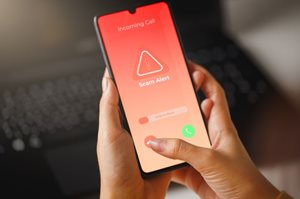Recently there has been an increase in fraudulent actors attempting to gain access to credit union members' accounts across Colorado. This is not something that has been limited to specific credit unions, scammers could target anyone. We have put information and resources together to help protect your financial security and well-being.
Below is the reported process that a scammer used to commit fraud at one credit union and what members should look out for:
- Member gets a call or text pretending to be the credit union about questionable charges on the debit or credit card, or even account.
- Fraudster has key pieces of information, like last four digits of the card number, who is on the account, SSN info, phone numbers, possibly even address information.
- When the member says “no, those aren’t my charges”, the fraudster says they can assist with shutting the card down and stop the charges. They just need to verify the member.
- Fraudster asks the member to confirm their online banking user ID for member verification. 🚩C∙U∙D would not ask for this information!
- Fraudster enters that and uses "FORGOT PASSWORD" so they can reset the password and take over the account.
- Fraudster then says something like, “I just sent you a code for verification, please read back the code.” The code is really the secure access code for the password change in online banking.
- From there, the fraudster controls the online banking account. They can begin to set up account to account transfers, etc.
As a reminder, Credit Union of Denver will never call, email, or text asking for personal information such as the last four digits of your card number, names on the account, your Social Security number, phone numbers, or even address information.
What Should You Do?
If you receive any suspicious phone calls or texts, please do not respond to them, don't redial that number, or click any links provided.
Instead reach out to us directly by calling a representative at 303.234.1700. Staff are trained to confirm your identity by asking you security questions that only you would know the answers to. We will then be able to verify with you if that was real or an attempted scam.
Rest assured Credit Union of Denver is not compromised. These fraudsters can get information from any number of resources in the digital world. Scammers simply attempt to lure their victims into providing PII (personal identification information) and/or banking account/routing numbers to begin their victim exploitation.
How To Keep Your Accounts Safe from Fraud
Use Unique Passwords for all Your Accounts
It’s important to use a strong password that’s at least 12 characters long with a combination of uppercase letters, lowercase letters, numbers, and symbols. It’s just as important that you don’t reuse the same strong password for multiple accounts; if one account becomes compromised then the rest could fall as well. It’s also important to update your passwords on a regular basis, at least once a year.
Get A Password Manager
Password managers can create strong passwords for you and store them securely, so you never have to struggle to remember a forgotten password again.
Leverage Multi-Factor Authentication
 With this method, you’ll need your password and another proof of identity to log in, like a one-time code sent to your phone. If hackers get a hold of your bank account login credentials, it makes it difficult for them to log in without your second verification. You can also utilize biometrics (fingerprint or facial recognition) to access your account safely and securely via smartphone.
With this method, you’ll need your password and another proof of identity to log in, like a one-time code sent to your phone. If hackers get a hold of your bank account login credentials, it makes it difficult for them to log in without your second verification. You can also utilize biometrics (fingerprint or facial recognition) to access your account safely and securely via smartphone.
Update Everything
Every piece of technology you use is open to an attack and their companies are always finding new bugs and fixing them. That’s why it’s crucial you download and update the latest versions of the apps and software you’re using. Hackers search for security holes in systems, so do your best to protect your bank account from fraud by ensuring your devices are as protected as possible.
Remove Apps & Browser Extensions You Don’t Need
As more apps are installed on a device, it can become more vulnerable. On devices that have access to sensitive information, only install the apps and browser extensions you need. To better protect your personal info, don’t install unknown apps or apps from unknown sources.
Learn How to Spot a Scam
 When a new email or text message arrives and it includes something that can be tapped or clicked, don’t immediately click it. Scam messages try to trick people into behaving in a way they wouldn’t normally like with messages that say an urgent response is required. Be cautious, think before you click, and only download files from people and sources you know and trust.
When a new email or text message arrives and it includes something that can be tapped or clicked, don’t immediately click it. Scam messages try to trick people into behaving in a way they wouldn’t normally like with messages that say an urgent response is required. Be cautious, think before you click, and only download files from people and sources you know and trust.
Be Cautious of Public Wi-Fi
If you’re doing something that requires entering personal information or login credentials, such as signing into your online bank account, it’s best to avoid while on public Wi-Fi.
Don’t Overshare on Social Media
Be cognizant of not oversharing, the more of your personal data a hacker has, the greater likelihood they can use that information to get into your account.
Utilize Card Control Features
Timely notifications of account activity can help identify suspicious activity quickly.
- Card Lock – Turns your Debit, Credit or HELOC Card “Off” to block all purchases, or “On” to allow purchases.
- Spending Limits – Declines transactions that surpass the limit set by you.
- Per Transaction Limit
- Per Month Limit
- Transaction Alerts – Be alerted via text message for all transactions that occur on that card.
- Spending Alert – Alerts for transactions that surpass the limit set by the member.
- Per Transaction Alert
- Per Month Alert
With the help of the tips above and staying up to date on the latest scams, you should be able to protect yourself and your personal information. To learn more about cyber security, protecting your credit, and how to avoid fraud & scams visit Credit Unions of Denver’s Security Center.
As a reminder, if you ever receive a questionable message/call or notice any suspicious activity on your account, please call us directly 303.234.1700 | 800.279.3288 and ask for assistance. We take account security seriously and are happy to help! Please stay safe and stay alert.